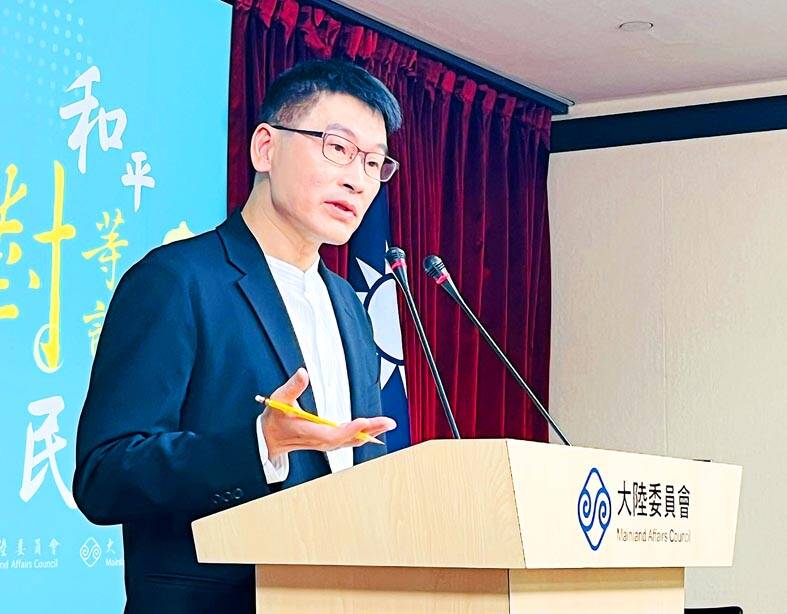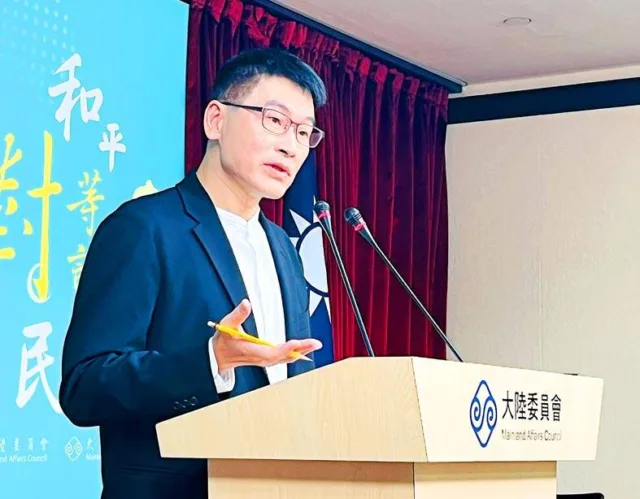-
By Shelley Shan / Staff reporter
The Mainland Affairs Council (MAC) yesterday said that it did not receive an application from Taikoo Motors Group to invite executives of BYD Co to travel to Taiwan, adding that it agrees with the Ministry of Economic Affairs’ position on scrutinizing imports of Chinese cars.
Taikoo is BYD’s official dealer in Taiwan.
The Chinese electric vehicle (EV) maker’s attempt to export EVs to Taiwan under the brand Denza via Thailand came under public scrutiny after Taikoo reportedly hosted a banquet at a Michelin-starred restaurant in Taipei, which was attended by Legislative Yuan General Affairs Department Director Liao Chiung-chih (廖炯志), and personnel of Legislative Yuan Speaker Han Kuo-yu (韓國瑜) and Deputy Speaker Johnny Chiang (江啟臣).

Photo: Chen Yu-fu, Taipei Times
Some Taiwanese media reported that Chinese BYD executives also attended.
“We did not find any such application from Taikoo. If BYD did send executives, they might not be Chinese nationals, which would not fall under our jurisdiction. However, they could be holding passports from the US and other countries. We need to look into that,” MAC Deputy Minister and spokesman Liang Wen-chieh (梁文傑) said.
Chinese EV makers are able to sell their products in overseas markets at far cheaper prices than those manufactured in advanced countries, due to huge amounts of government subsidies and overproduction, Liang said.
Importing Chinese EVs could have national security implications, as they could connect to the Internet and collect data, he added.
“We do not know where information would be stored and what they would do with the data,” Liang said. “Basically, we agree with the economic affairs ministry’s position that Chinese vehicles should be strictly scrutinized before being allowed entry, to safeguard national security, cybersecurity, automobile safety and industry order.”
Chinese Nationalist Party (KMT) Legislator Chen Yu-jen (陳玉珍) also questioned Liang about the change the Ministry of the Interior proposed to the Regulations Governing Residency Permits for Mainland Chinese Citizens for Family Reunification in the Taiwan Area (大陸人民在台灣地區的依親居留許可辦法), which would require Chinese nationals seeking Taiwanese residency to prove that they do not have Chinese passports, asking how Chinese would be able to do so when the Constitution was written in a “one China” framework with two political entities.
Liang said that the proposal has nothing to do with Taiwanese independence.
The Act Governing Relations Between the People of the Taiwan Area and the Mainland Area (臺灣地區與大陸地區人民關係條例) stipulates that Chinese nationals seeking to reside in Taiwan must provide proof of loss of original household registration and are not allowed to hold or use Chinese passports, he said.
While the former is enforced in most cases, the latter is difficult to enforce, as only 12 percent of Chinese have passports, he said.
When traveling across the Taiwan Strait, Taiwanese use the Mainland Travel Permit for Taiwan Residents, while Chinese use the Mainland Resident Travel Permit to Taiwan, Liang said, adding that neither use passports.
The new regulations would require Chinese to submit proof that they do not have a Chinese passport, he said.
“If they cannot produce such proof, or they never had a Chinese passport, they would be required to sign an affidavit,” he added.
Asked if five Chinese who were elected as borough wardens or village chiefs could renounce their Chinese nationality by simply signing an affidavit, Liang said this issue involves two different regulations.
“The cross-strait act permits Chinese nationals to run for office if they have had house registration for 10 years or longer, while the Nationality Act (國籍法) requires elected officials to renounce their other nationalities within one year after they are elected. It does not matter what their other nationality is; they can only have one nationality: Taiwanese,” Liang said.
Hualien County’s Fuli Township (富里) chief Deng Wanhua (鄧萬華) was removed from her post on Friday last week for failing to renounce her Chinese citizenship.
She vowed to file an administrative appeal, saying that China does not allow Chinese spouses to renounce their nationality, and that the government’s requirement was unreasonable.
The cases of four other Chinese wardens would be handled based on the law, Liang said.









